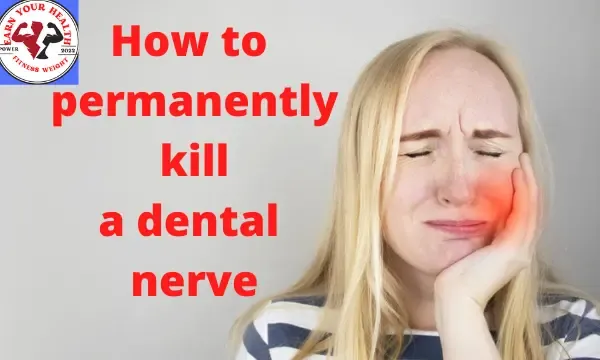Tooth nerve pain

- causes of dental nerve inflammation
- symptoms of dental nerve inflammation
- how to treat dental neuritis
- how to permanently kill a dental nerve
- how to kill a dental nerve
- prevention of dental neuritis
Dental nerve
inflammation is a bacterial or viral infection that affects the nerve of the
tooth, and the nerve of the tooth is a nerve that extends from the nervous
system to the roots of the tooth, and contains blood vessels and supporting
tissues.
Usually the
inflammation in the nerve extends to the area next to it, reaching the area of
enamel and dentin, which causes severe tooth pain.
Causes of dental nerve inflammation
Neglecting
oral health.
Injury to
the tooth and leaving it untreated to later extend to the nerve.
Exposure to
various fractures that may affect the pulp and nerves of the tooth
The pulp and
nerves of the roots of the teeth, as well as the gums, are susceptible to
periodontal infection.
Postponing
the treatment of dental caries exposes one to the problem of neuritis of the
teeth.
Symptoms of dental nerve inflammation
Dental
neuritis is associated with a number of different symptoms, the most prominent
of which are the following:
Severe and
persistent pain in the tooth.
Swollen and
swollen gums.
The
occurrence of an abscess in the teeth or gums, and the abscess is defined as
yellow-colored pus and a foul smell
How to treat dental neuritis
When
treating the main cause of dental nerve inflammation, the nerve heals
completely and the pain disappears, and this condition often works if you see a
doctor as soon as you feel a slight pain before it becomes severe.
In this
case, the reason is most often:
Tooth decay:
It is treated by placing crowns.
Gingivitis:
treated with antibacterial drugs.
Remove the
nerve by pulling on it.
In the event
that the nerve is severely damaged and there is no possible percentage of its
treatment, the nerve is pulled to permanently get rid of the dental nerve
inflammation and repair the tooth, and this is done by following the following
steps:
The doctor
first cleans the entire tooth from decay.
To access
the nerve space, the doctor makes a hole in the tooth.
The doctor
works to pull out the nerve and affected tissue with special tools and very
carefully. The doctor cleans all the canals in the dental nerve. This is
because forgetting to clean any part leads to the return of inflammation and
pain again, and with the development of devices used during the operation, it
became easier, as X-rays are used to determine the depth of the roots and thus
clean the roots. the roots. The whole pulp.
The doctor
works to fill the tooth with a temporary filling until the preparation of the
permanent filling, which is called the artificial crown.
The doctor
performs several sessions that require filling the nerve and the entire tooth,
and the doctor may add a dowel to the affected tooth if it is very eroded.
Teeth extraction
It is an
option that the patient loves very much, it is a quick and inexpensive option
and the effect is immediate, but the patient often needs to treat the
inflammation of the dental nerve with antibiotics so that the doctor can
extract the tooth without worrying about it. The spread of infection and
increased pain.
This method,
despite its positiveness, which the patient believes, is very negative from a
medical point of view, as it leads to the following:
Loss of age
is very detrimental to the digestive process.
The gums
will be pressed, increasing the likelihood of gum disease.
How to permanently kill a dental nerve
When a dental procedure known as a root canal is performed, the affected nerve inside the tooth is removed, the canals holding it in and disinfected, and the canals closed with an inert, biocompatible material. This procedure is commonly referred to as "nerve killing."
There is another way how to kill a dental nerve
cold
compress; Apply ice to the affected side for 15 minutes and 15 minutes. ...
Rinse with
salt water. ...
Listerine
rinse. ...
Hydrogen
peroxide rinse. ...
oregano oil.
...
Mint tea
bag. ...
garlic. ...
Thyme oil
and clove oil
Prevention of dental neuritis
Maintain
oral and dental hygiene by cleaning them on a daily basis.
Use
effective materials in cleaning the teeth in terms of toothpaste and brush.
Use the
appropriate floss and lotion.
See your
doctor twice a year.
Warning
Do not rinse
your mouth with over-the-counter medicines for toothaches, such as hydrogen
peroxide, diluted bleach, lemon juice, etc., in an effort to "kill the
infection." They might make your teeth more sensitive and/or hurt your
mouth chemically.






